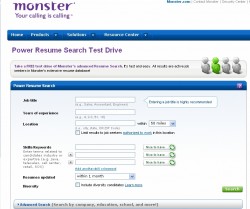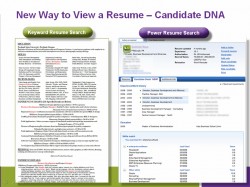 When Monster bought Trovix in the summer of 2008, the blogosphere popped with wonder at how the job board would make use of Trovix’ job matching technology.
When Monster bought Trovix in the summer of 2008, the blogosphere popped with wonder at how the job board would make use of Trovix’ job matching technology.
Forrester Research analyst Zach Thomas suggested that, “By making this acquisition, Monster is putting a real emphasis on search and they believe it will help them leap-frog the competition.” Others were less generous.
The answer has been coming ever since Monster began beta testing Power Resume Search several months ago. A few weeks ago, confident that its $100 million investment was the homerun it expected, Monster turned Power Search live, premiering it during an analyst meeting that was also webcast over a marathon five hours or so.
Tuesday, the company demoed the new search for a group of recruitment consultants and bloggers. And the result was no mere home run; think grand slam.
In a word, Monster’s new Power Resume Search is stunning. Stunning in its simplicity. Stunning in its speed. Stunning in its ability to intuit skills from a title, and to rank and rerank the resulting candidates depending on what skills and other qualities you decide important. Stunning in its potential for changing the job board business.
 If you haven’t tried it for yourself, go here and test it out. What you’ll discover is that you can source candidates (if you really want) simply by entering a job title. Look at the results. Add a specific skill or a degree or some other parameter and the ranking changes.
If you haven’t tried it for yourself, go here and test it out. What you’ll discover is that you can source candidates (if you really want) simply by entering a job title. Look at the results. Add a specific skill or a degree or some other parameter and the ranking changes.
What makes Power Resume Search different — and better — than the typical keyword resume search is that it has the intelligence to cut through the duff. The examples the Monster folks used in the demo were searches for bankers and lawyers. But try your own search, for, say a bookkeeper. Instead of getting a list of hundreds of resumes with bookkeeper in the text, you get a few dozen candidates who are bookkeepers and are most likely to be looking for that kind of work.
Trovix built its job-matching capability around context and concepts. A bookkeeper doesn’t need an understanding of Sarbanes-Oxley; a CFO does. You know that. But unless you exclude candidates with that term in their resume in a standard keyword search, you’re going to get CFO candidates with bookkeeping in their backgrounds along with accountants and … you get the idea.
It’s “the world’s best search engine,” said Monster’s Javid Muhammedali at the beginning of the demo. Google might take issue with the boast, but he is certainly on the mark when he says one of the virtues of Power Resume Search is that it is a search engine “that really helps you stop searching.”
One incidental, yet valuable feature is how a search can unearth skills not listed in the job req, which could or should be. It helps drive the recruiting process forward by arming recruiters with information they can take back to the hiring manager, Muhammedali explained.
 It has some other nice touches, including how it presents candidate information and the side-by-side comparison of candidates.
It has some other nice touches, including how it presents candidate information and the side-by-side comparison of candidates.
Power Resume Search has a counterpart for job seekers in Power Job Search.
I ran a few job searches on a variety of different titles and got great results, which, in my case, meant fewer, but more accurate results. Monster showed this off during the demo using “business development manager” for the search with the result that all nine listings were specific to the title.
Monster points out that this search has benefits for the employer: the ad visibility improves, as does the likelihood that the applicants will be of higher quality since an ad won’t just turn up in a search because it happens to contain the seeker’s keywords.
Before you go away thinking all your sourcing problems are solved, know that this is a premium service, for which Monster will charge $845 for a two-week access. Right now, it’s a bargain at $260 for three days of searching in an area.
It’s also better at sourcing some types of jobs than others. New job terminology has to be added by Monster, though you can search for a specific keyword in a resume. And it won’t store search histories for OFCCP auditing until early next year.
Even so, it’s a big step. For Monster, it’s a $100 million-plus step. The company spent $72.5 million to acquire Trovix and $30-$35 million more integrating it into the job board. Monster intends to get back its investment and then some.
Muhammedali and Louis Gagnon, SVP Global Products, said the new search opens the door to differential pricing for resume sourcing. It probably won’t be long before Monster puts a higher price on CFOs than on bookkeepers.
Why can’t they do that now? They probably could, but the technical management is a challenge, since the resumes of CFOs and bookkeepers may well be part of the search results in a standard keyword search. But the Trovix powered search is smart enough to know that when you’re looking for a CFO, you don’t want a bookkeeper who reports to a CFO.
Narrowing down results with high precision saves time. Lots of time. And gets better results. That’s worth something.